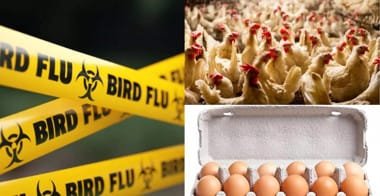Bird Flu Fear Triggers 30% Surge in Fish Consumption Across Hyderabad
The outbreak of bird flu in Andhra Pradesh and growing concerns in Telangana have significantly altered consumer behaviour in Hyderabad, leading to a 30% spike in fish consumption over the past two weeks. With widespread caution against poultry products, Hyderabad’s non-vegetarian community is increasingly opting for fish as a safer alternative. This shift in dietary preferences has not only driven up fish sales but also resulted in a 20% increase in prices. Officials anticipate that this trend will persist for at least two more weeks as consumers remain wary of chicken consumption.
Simultaneously, soaring mutton prices—touching ₹1,000 per kilogram—have further solidified fish as the preferred protein source among consumers. Daily fish supplies to the twin cities have surged to approximately 600 tonnes, with the majority arriving at the city’s two main wholesale markets in Ramnagar and Begum Bazaar. Of this, 80% consists of white fish varieties like Catla, Rohu, and Mrigal, as well as the black fish variety Murrel, sourced from reservoirs and local water bodies within Telangana. The remaining stock, primarily sea fish, is imported from Andhra Pradesh’s coastal districts.
Fish Becomes the Protein of Choice Amidst Poultry Concerns
The state’s Fisheries Department has played a crucial role in stabilising supply, with local fish production bolstered through seed distribution schemes. However, the outbreak of bird flu in East and West Godavari districts has drastically impacted poultry consumption, with many Hyderabad residents avoiding chicken altogether.
The effect has been especially pronounced over the past two Sundays, traditionally popular for non-vegetarian meals, as consumers flocked to fish markets instead of poultry shops. Telangana Fishermen Cooperative Federation Limited General Manager V. Srinivas confirmed that major fish markets, including those at Banjara Hills, Shanthinagar, Masab Tank, Vanasthalipuram, and Lower Tank, witnessed an unprecedented surge in demand for both white and black fish varieties.
This shift extends beyond home kitchens, as wedding caterers and event organisers are also modifying their menus. Several marriage receptions held on Monday and Tuesday reportedly excluded chicken dishes, replacing them with popular alternatives like Apollo fish fry, mutton biryani, and Marag—a traditional Hyderabadi mutton stew.
Civic and Urban Impact: Managing Hyderabad’s Changing Food Market
The sudden spike in fish demand has put pressure on Hyderabad’s supply chain, forcing retailers to adjust prices amid rising procurement costs. Experts warn that if this trend continues, affordability may become a concern for lower-income groups, who traditionally rely on poultry as a primary protein source.
Beyond food preferences, this shift also highlights broader urban governance challenges, as city officials now face the task of ensuring balanced food supply and preventing market exploitation. The civic administration may need to intervene in price regulation if inflationary pressures escalate further. Meanwhile, public health authorities continue to monitor the poultry sector closely, with stringent biosecurity measures in place to curb further bird flu transmission.
Sustainability Angle: A Push for Responsible Aquaculture
The ongoing crisis also raises critical sustainability questions about Hyderabad’s fish industry. While aquaculture within Telangana’s reservoirs provides a steady local supply, the sudden surge in demand could lead to overfishing, depletion of fish stocks, and increased pressure on natural water bodies.
Experts advocate for responsible fish farming practices, urging authorities to invest in sustainable aquaculture models that prioritise long-term food security. Additionally, with consumers shifting away from poultry, this moment presents an opportunity to promote alternative protein sources, such as plant-based proteins and sustainable seafood options, which could play a significant role in future food resilience strategies.
As Hyderabad adapts to this temporary but impactful dietary shift, the key challenge will be maintaining a stable food ecosystem while ensuring public confidence in food safety. Whether this shift towards fish consumption is a short-term reaction or an indicator of a broader change in dietary habits remains to be seen. However, for now, fish is undeniably ruling Hyderabad’s food landscape.



